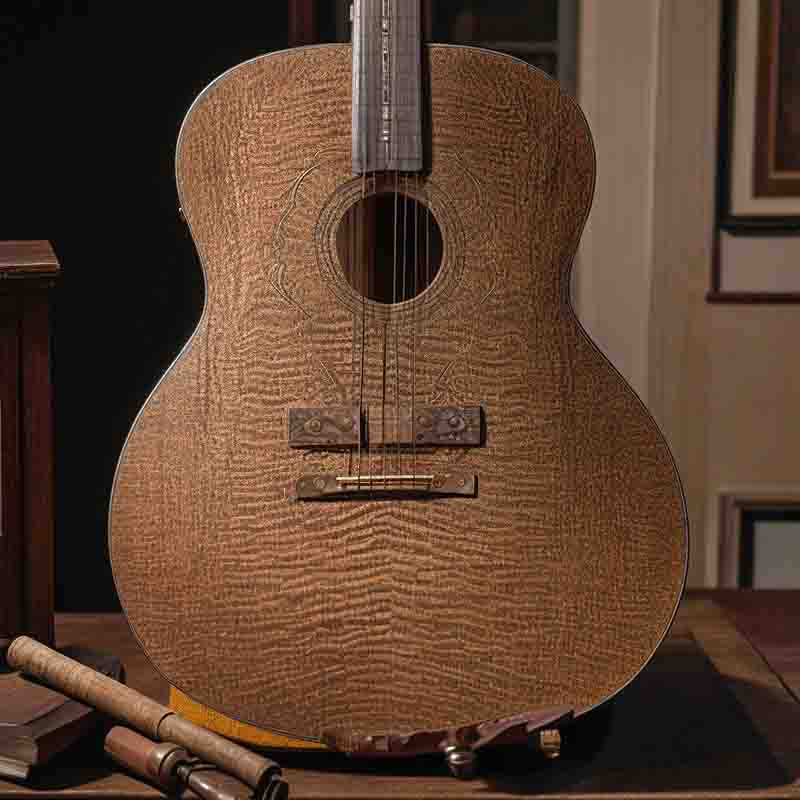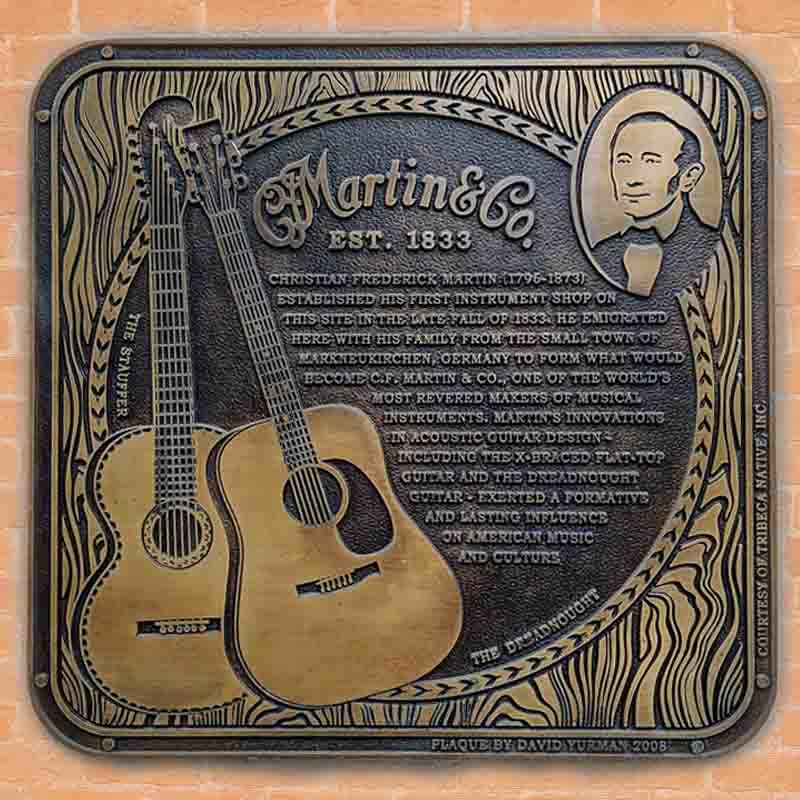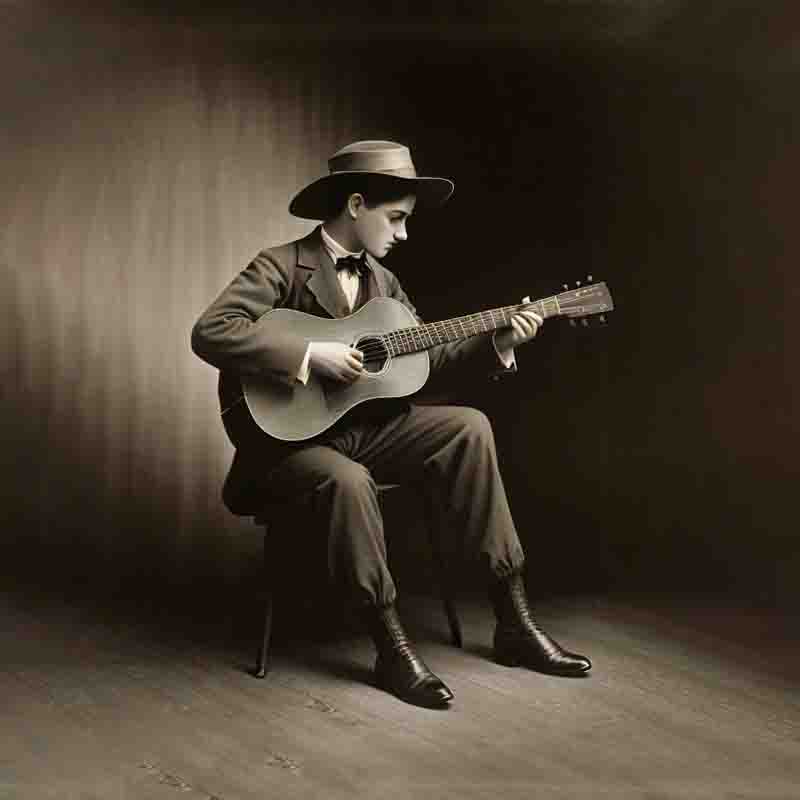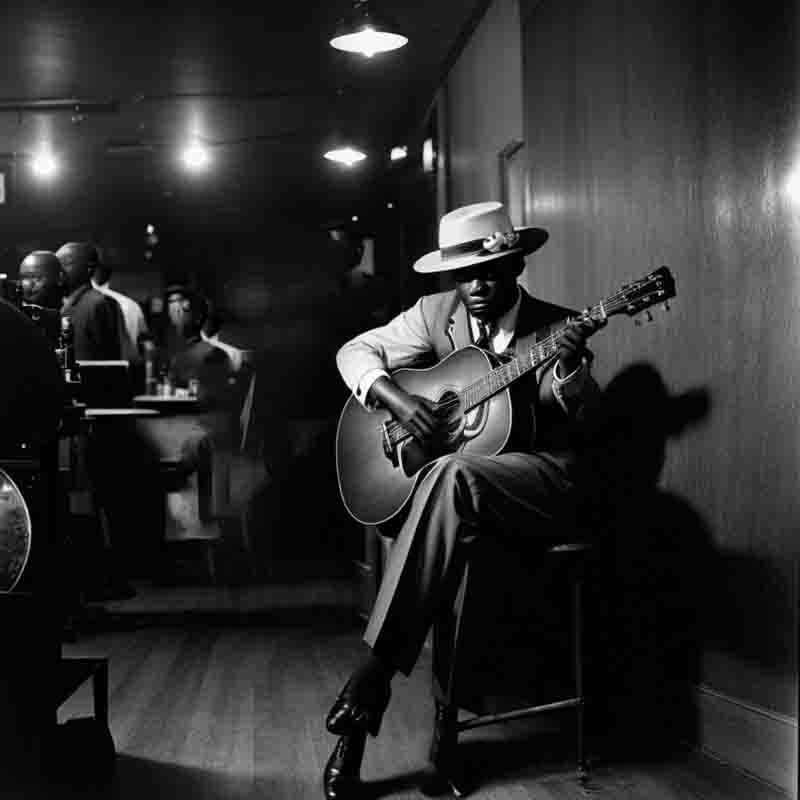The legacy of Martin guitars
Christian Frederick Martin, commonly known as C.F. Martin, was a German emigrant who played a significant role in the history of guitar manufacturing in the United States. He founded the company C.F. Martin & Company, which would go on to become one of the most successful and influential producers of steel-string guitars.

In 1833, Martin made the significant decision to emigrate to the United States, seeking new opportunities for his guitar-making business. He arrived in New York City with a vision to establish himself as a luthier in the American market.
German American Martin hailed from a family of cabinet makers and instrument builders. The knowledge of building high quality, traditional European style guitars was imparted to him by his father, Johann Georg Martin.
In 1833, at the age of 37, Christian Frederick Martin emigrated to the USA to launch his own guitar business. He set up store in New York and began building guitars with his unique skills and attention to detail. At the time, the prevalent guitar style in America was the Spanish-style fan-braced guitar with gut strings.
Martin's guitars, however, deviated from the conventional design. He incorporated X-bracing into his instruments, a structural innovation that improved the strength and resonance of the guitar's top, especially when paired with steel strings. This marked the birth of the modern steel-string guitar and revolutionized the instrument's sound, projection, and versatility.
The popularity of Martin's guitars grew steadily, attracting the attention and admiration of renowned musicians as word spread about the quality and playability of Martin guitars.
Christian Frederick Martin passed away in 1873, but the C.F. Martin & Company continued to evolve under successive generations of the Martin family. His son, C.F. Martin Jr., took over the business and expanded its reach. The company relocated to Nazareth, Pennsylvania, where it remains headquartered to this day
Over the years, Martin guitars have become renowned for their exceptional craftsmanship, tone, and durability. The company has introduced various models and styles to cater to different musical genres and playing styles, ranging from dreadnoughts to small-bodied guitars.
Today, C.F. Martin & Company is considered a premier manufacturer of acoustic guitars and remains a family-owned business. With a rich heritage spanning nearly two centuries, Martin guitars continue to be cherished by musicians worldwide, making Christian Frederick Martin's dream a lasting reality and solidifying his company's status as the most successful producer of steel-string guitars.
Martin's German heritage and training played a significant role in shaping his approach to guitar making. His guitars blended German expertise with American innovation, resulting in instruments that were highly regarded for their quality, playability, and sound.
Early Life and Training

Markneukirchen is known for its long history of instrument making. The town has been home to instrument makers since the 16th century, and today it is one of the world's leading centers for the production of musical instruments.
Christian Frederick Martin's early life and training played a crucial role in shaping him into the skilled guitar maker he became.
Born on January 31, 1796, in Markneukirchen, Germany, Christian Frederick Martin was born into a family with a rich heritage in cabinet making and instrument building. Growing up in this environment, he was exposed to the artistry and craftsmanship required to create finely crafted instruments.
Martin's training in guitar making began under the guidance of his father, Johann Georg Martin, who was an accomplished and respected guitar maker himself. His father imparted invaluable knowledge and skills to young Christian, teaching him the intricacies of wood selection, instrument design, and construction techniques.
In the Martin household, guitar making was a family tradition, passed down through generations. This allowed Christian Frederick Martin to benefit from the accumulated wisdom and expertise that had been refined and perfected over time.
Under his father's tutelage, he learned the delicate art of shaping the body, constructing the neck, and applying finishes that would enhance both the aesthetic appeal and tonal qualities of the instruments.
Martin's training went beyond technical proficiency. He developed a deep appreciation for attention to detail, precision, and the pursuit of excellence. These values would become integral to his approach as he embarked on his own guitar-making journey.
The combination of his family's heritage, the guidance of his father, and his own dedication to the craft laid a solid foundation for Martin's future success. The skills and knowledge he acquired during his formative years would become the bedrock upon which he built his reputation as a masterful guitar maker.
Emigration to the United States

In the 19th century, a significant number of Germans immigrated to the United States. The overall number of German immigrants in the years 1820 to 1899 was about five million
In 1833, motivated by the prospect of expanding his guitar-making business and exploring the burgeoning American market, he embarked on a journey across the Atlantic Ocean.
He arrived in the bustling city of New York determined to establish himself as a luthier in America. The decision to emigrate was not an easy one, as it meant leaving behind familiar surroundings and venturing into the unknown. However, Martin's entrepreneurial spirit and belief in his craft propelled him forward.
Upon arriving in New York City, Martin wasted no time in setting up his guitar-making shop. He established his business in Lower Manhattan, an area known for its vibrant trade and commerce. The city provided an ideal location for Martin to showcase his skills and tap into the growing demand for musical instruments in America.
He had to adapt to a different cultural and market landscape, understand the tastes and preferences of American musicians, and navigate the complexities of building a business in a foreign land.
Martin's innovative approach to guitar making quickly gained him attention and acclaim. His guitars stood out for their superior quality.
The emigration of Christian Frederick Martin to the United States set in motion a chain of events that would shape the American guitar industry. His arrival brought a fusion of German values and American innovation that affected the evolution of the acoustic guitar and laid the foundation for the rise of the steel-string guitar in the United States.
Expatriation was a pivotal experience for Martin, allowing him to broaden his own horizons and to leave an indelible mark on the guitar building world. It was in the United States that he would establish the foundation of C.F. Martin & Company, a company that has become synonymous with excellence.
Founding C.F. Martin & Company

Memorial plaque outside 196 Hudson Street, NYC, the first Martin & Co. guitar shop.
The founding of C.F. Martin & Company marked a significant milestone in the life and career of Christian Frederick Martin.
The early years of Martin's business were characterized by his unwavering commitment to craftsmanship, attention to detail, and dedication to producing high-quality instruments. His expertise and innovative approach quickly gained recognition, attracting the attention of musicians who sought out his guitars.
One of the notable contributions Martin made was the introduction of X-bracing, a structural innovation that enhanced the strength and resonance of the guitar's top. This innovation became a defining feature of Martin guitars and a key factor in their success.
As Martin's reputation grew, so did the demand for his instruments. Musicians chose his guitars for their music. The solid construction and attention to detail of each Martin guitar set standards in the industry.
The early success of Martin's business laid the groundwork for the formal establishment of C.F. Martin & Company. The company's commitment to quality and innovation soon became synonymous with its name. The combination of Christian Frederick Martin's vision, skill, and entrepreneurial spirit led to the establishment of a brand that would endure for generations to come.
Under Martin's leadership, the company experienced steady growth, and its guitars began to gain wider recognition. As the reputation of C.F. Martin & Company expanded, musicians from different genres sought out Martin guitars for their performances and recordings.
Today, C.F. Martin & Company remains a family-owned business, upholding the traditions and values set forth by its founder, and continues to produce exceptional instruments that are celebrated by musicians worldwide.
Innovation and Contributions

The high quality of Martin guitars quickly became known in the US. Today it is actually easier to make a list of musicians who have no Martin in their arsenal than the reverse.
Christian Frederick Martin was not only a skilled craftsman but also an innovative thinker who made significant contributions to the world of guitar making. His forward-thinking approach and creative solutions have had a lasting impact on the industry. Here's an elaboration on his innovation and contributions:
-
Introduction of X-Bracing: One of Christian Frederick Martin's most notable innovations was the introduction of X-bracing. This structural design, in which two braces cross each other in an X pattern on the guitar's soundboard, greatly enhanced the instrument's strength and resonance. The X-bracing system allowed Martin guitars to handle the increased tension of steel strings and produce a richer, louder, and more balanced sound. This innovation became a hallmark of Martin guitars and revolutionized the development of the steel-string guitar.
-
Transition to Steel-String Guitars: Prior to Martin's innovations, guitars were typically designed for gut strings. However, Martin recognized the potential of steel strings and adapted his instruments accordingly. With the introduction of X-bracing, Martin guitars became better suited for the higher tension and increased projection of steel strings. This transition from gut to steel strings expanded the sonic possibilities of the guitar and opened up new avenues for musicians, particularly in genres like folk, country, blues, and eventually rock.
-
Refinement of Guitar Design: Martin made numerous refinements to guitar design, incorporating features that enhanced both playability and sound quality. He experimented with body shapes, bracing patterns, and scale lengths, constantly striving to improve the overall performance of his guitars. By refining these elements, Martin guitars offered superior tonal balance, sustain, and responsiveness, making them highly sought after by professional musicians.
-
Craftsmanship and Attention to Detail: Christian Frederick Martin's commitment to craftsmanship and attention to detail set his guitars apart. His relentless pursuit of excellence ensured that every aspect of the guitar, from wood selection to joinery, from finish to fretwork, was executed with precision and care. The meticulous craftsmanship and quality control measures implemented by Martin became benchmarks for the industry and contributed to the renowned reputation of Martin guitars.
-
Influence on Guitar Making: Martin's innovations and contributions significantly influenced the wider guitar-making community. Other luthiers and manufacturers took note of Martin's advancements, and many incorporated similar techniques and designs into their own instruments. The impact of Martin's innovations extended beyond his own guitars, shaping the industry and contributing to the evolution of acoustic guitar design and construction.
-
Enduring Legacy: The innovations and contributions of Christian Frederick Martin have left an enduring legacy. Today, Martin guitars are recognized worldwide for their exceptional sound, craftsmanship, and playability. Musicians across generations continue to choose Martin instruments for their performances and recordings, perpetuating the influence of Martin's innovations on the music industry.
Christian Frederick Martin's forward-thinking approach, innovative designs, and dedication to craftsmanship have left an indelible mark on the art of guitar making. His contributions have shaped the sound and capabilities of the modern acoustic guitar, cementing his position as a pioneer and innovator in the field.
Popularity and Recognition

On Muddy Waters' first blues recordings for the Library of Congress by Alan Lomax in 1941 followed by one in 1942 at the Stovall Plantation, Waters played a Martin Acoustic Guitar that he had borrowed from Lomax.
Christian Frederick Martin's guitars quickly gained popularity and earned recognition among musicians, leading to the establishment of a strong reputation for C.F. Martin & Company. Here's an elaboration on the popularity and recognition of Martin guitars:
-
Exceptional Sound: Martin guitars were celebrated for their exceptional sound quality. The innovative designs, including the X-bracing system, resulted in instruments that produced a rich, balanced, and resonant tone. Musicians were drawn to the distinct and pleasing sound that Martin guitars offered, making them highly sought after for both live performances and studio recordings.
-
Iconic Acoustic Performances: Christian Frederick Martin's guitars gained recognition and patronage from influential musicians. Artists such as Gene Autry, Johnny Cash, Woody Guthrie, and Elvis Presley, among many others, played Martin guitars and helped popularize the brand. The endorsement of these renowned musicians contributed to the growing reputation and desirability of Martin guitars.
-
Durability and Reliability: Martin guitars earned a reputation for their durability and reliability. The high-quality materials used in their construction, coupled with the meticulous craftsmanship, ensured that these instruments could withstand the rigors of touring and frequent use. Musicians valued the longevity and consistency of Martin guitars, which further contributed to their popularity.
-
Cross, and Sub-Genre Appeal: Martin guitars transcended specific genres, appealing to a wide range of musicians and musical styles. From folk to country, blues to rock, Martin guitars found a place in various genres and subgenres. Their versatility and ability to produce a balanced and resonant tone made them a go-to choice for musicians seeking an instrument that could adapt to different musical contexts.
-
Legacy and Enduring Reputation: The popularity and recognition of Martin guitars have endured over time. The legacy established by Christian Frederick Martin has been carried forward through successive generations of the Martin family, maintaining the company's commitment to quality and craftsmanship. Today, Martin guitars continue to be revered for their exceptional sound, craftsmanship, and their association with the rich musical heritage that they have helped shape.
The popularity and recognition of Martin guitars among musicians and audiences alike have solidified the brand's status as a leading manufacturer of acoustic instruments. The combination of superior craftsmanship, exceptional sound, and patronage by notable musicians has elevated Martin guitars to an iconic and highly respected position in the music industry.
Legacy and Success

German instrument-making techniques and craftsmanship merged with American influences, creating a unique blend that influenced the development of guitar making in the country.
The legacy of Christian Frederick Martin and the success of C.F. Martin & Company have left an indelible mark on the world of guitar manufacturing. Here's an elaboration on the legacy and success of Martin guitars:
-
Enduring Reputation: The legacy of Martin guitars is built on their enduring reputation for exceptional quality, and sound. Martin's unwavering commitment to excellence, attention to detail, and innovative designs have made the brand synonymous with superior instruments. The continued recognition and admiration for Martin guitars among musicians and collectors speak to the enduring legacy of the company.
-
Influence on Guitar Making: C.F. Martin & Company's contributions to guitar making have had a profound impact on the industry. The innovations introduced by Christian Frederick Martin, such as X-bracing and the transition to steel-string guitars, revolutionized acoustic guitar design and set new standards for sound and playability. The influence of Martin's designs can be seen in guitars made by other manufacturers, demonstrating the far-reaching impact of their contributions.
-
Musical Icon Associations: Martin guitars have become closely associated with iconic musicians and legendary performances. The sound of Martin guitars has been an integral part of influential recordings and live shows. These associations have helped solidify Martin's place in music history and further contributed to their success.
-
Family-Owned Tradition: A key aspect of Martin's legacy and success is its status as a family-owned business. The Martin family has maintained control and stewardship of the company for over 180 years, passing down their knowledge, values, and commitment to quality from one generation to the next. This continuity has ensured the preservation of Martin's legacy and allowed the company to retain its identity and core values.
-
Expanding Range of Models: Martin's success can also be attributed to the company's ability to adapt and innovate while staying true to its roots. Over the years, Martin has expanded its range of models and styles to cater to different musical genres and playing preferences. Whether it's the classic dreadnought, smaller-bodied guitars, or specialized models for specific playing styles, Martin has continued to evolve and meet the needs of musicians while maintaining its commitment to quality.
-
Global Impact: The success of Martin guitars extends beyond the United States. Their reputation and influence have reached musicians and enthusiasts worldwide. Martin guitars are celebrated across continents, with a global community of musicians appreciating the quality, sound, and legacy of these instruments. This widespread recognition further cements Martin's position as a leading and influential guitar manufacturer.
The legacy and success of Martin guitars are the result of Christian Frederick Martin's vision, innovation, and unwavering commitment. The ongoing dedication to quality, the influence on guitar making, and the association with renowned musicians have solidified Martin's position as a legendary manufacturer, leaving a lasting impact on the world of music and guitar manufacturing.
Impact on the Music Industry
The impact of Christian Frederick Martin and his company, C.F. Martin & Company, on the music industry is profound and far-reaching. Here's an elaboration on their impact:
-
Shaping the Sound of American Music: Martin guitars have played a significant role in shaping the sound of American music. The introduction of steel-string guitars by Martin revolutionized the acoustic guitar's capabilities, enabling musicians to achieve a louder, more versatile sound. This innovation had a profound impact on music genres such as folk, country, blues, and rock, allowing for greater projection and tonal expression.
-
Enabling Musical Styles and Techniques: Martin guitars' contributions have enabled the development of specific musical styles and playing techniques. The rich, balanced tone and responsiveness of Martin instruments have been instrumental in the evolution of fingerpicking, flatpicking, and various acoustic guitar styles. Musicians have been able to explore new possibilities and push the boundaries of their creativity with the aid of Martin guitars.
-
Inspiring Future Generations: The influence of Martin guitars extends beyond the musicians who have played them. Martin's legacy has inspired countless aspiring guitarists and instrument builders. The company's commitment to quality, innovation serves as a model for aspiring luthiers and motivates them to strive for excellence in their own work.
-
Collector's Items: Martin guitars have become highly sought after by collectors worldwide. Vintage Martin guitars, especially those from specific eras or models, are considered highly valuable and collectible. The rarity and historical significance of these instruments reflect their impact on the music industry and contribute to their enduring legacy.
-
Continued Innovation: C.F. Martin & Company has continued to innovate and adapt to the changing needs of musicians and the music industry. The company has introduced new models, technologies, and materials while staying true to its core values. This ongoing commitment to innovation ensures that Martin guitars remain at the forefront of the industry and continue to shape the future of music.
-
Awards and Industry Recognition: Martin guitars consistently receive accolades and industry recognition for their craftsmanship and quality. They have won numerous awards for their design, tonal excellence, and overall contribution to the field of guitar making. Such recognition further solidifies Martin's standing as a preeminent guitar manufacturer and reinforces their influence in the music industry.
The impact of Christian Frederick Martin and his company on the music industry cannot be overstated. Their innovations, craftsmanship, and association with influential musicians have left an indelible mark on the sound, styles, and cultural significance of American music. Martin guitars continue to be revered for their exceptional quality, inspiring generations of musicians, and contributing to the ongoing evolution of the acoustic guitar.
Martin guitars: FAQ
Are you curious about music, art, technology, fashion, lifestyle, and beer?
If so, then you need to subscribe to the free Likewolf newsletter.
100% privacy. When you sign up, we'll keep you posted.
Carry On the Legacy
German Americans in the United States
